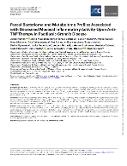Faecal bacteriome and metabolome profiles associated with decreased mucosal inflammatory activity upon anti-TNF therapy in paediatric Crohn's disease

Autor
Mascellani Bergo, Anna
Kubát, Michal
Karaskova, Eva
Hecht, Tomáš
Toukalkova, Lenka
Greinerova, Katerina
Cizkova, Anabela
Havlik, Jaroslav
Datum vydání
2024Publikováno v
Journal of Crohn's and ColitisNakladatel / Místo vydání
Oxford University PressRočník / Číslo vydání
18 (1)ISBN / ISSN
ISSN: 1873-9946ISBN / ISSN
eISSN: 1876-4479Informace o financování
UK//GAUK166119
FN//I-FNM
UK//I-LFP
FN//I-FNP-02
MSM//LX22NPO5103
Metadata
Zobrazit celý záznamTato publikace má vydavatelskou verzi s DOI 10.1093/ecco-jcc/jjad126
Abstrakt
BACKGROUND AND AIMS: Treatment by anti-TNFα antibodies (anti-TNF) changes the dysbiotic faecal bacteriome in Crohn's disease (CD). However, it is not known whether these changes are due to decreasing mucosal inflammatory activity or whether similar bacteriome reactions might be observed in gut-healthy subjects. Therefore, we explored changes in faecal bacteriome and metabolome upon anti-TNF administration (and therapeutic response) in children with CD and contrasted those to anti-TNF-treated children with juvenile idiopathic arthritis (JIA). METHODS: Faecal samples collected longitudinally before and during anti-TNF therapy were analysed for bacteriome by massively parallel sequencing of the 16S rDNA (V4 region) and for faecal metabolome by 1H nuclear magnetic resonance. The response to treatment by mucosal healing was assessed by MINI index at three months after the treatment started. We also tested several representative gut bacterial strains for in-vitro growth inhibition by infliximab. RESULTS: We analysed 530 stool samples from 121 children (CD 54, JIA 18, healthy 49). Bacterial community composition reacted on anti-TNF in CD: three members of class Clostridia increased on anti-TNF, whereas class Bacteroidia decreased. Among faecal metabolites, glucose and glycerol increased, whereas isoleucine and uracil decreased. Some of these changes differed by treatment response (mucosal healing) after anti-TNF. No significant changes in bacteriome or metabolome were noted upon anti-TNF in JIA. Bacterial growth was not affected by infliximab in a disc diffusion test. CONCLUSIONS: Our findings suggest that gut mucosal healing is responsible for the bacteriome and metabolome changes observed in CD, rather than any general effect of anti-TNF.
Klíčová slova
Crohn’s disease, IBD, anti-TNF, children, metabolomics, microbiome
Trvalý odkaz
https://hdl.handle.net/20.500.14178/2114Licence
Licence pro užití plného textu výsledku: Creative Commons Uveďte původ 4.0 International







